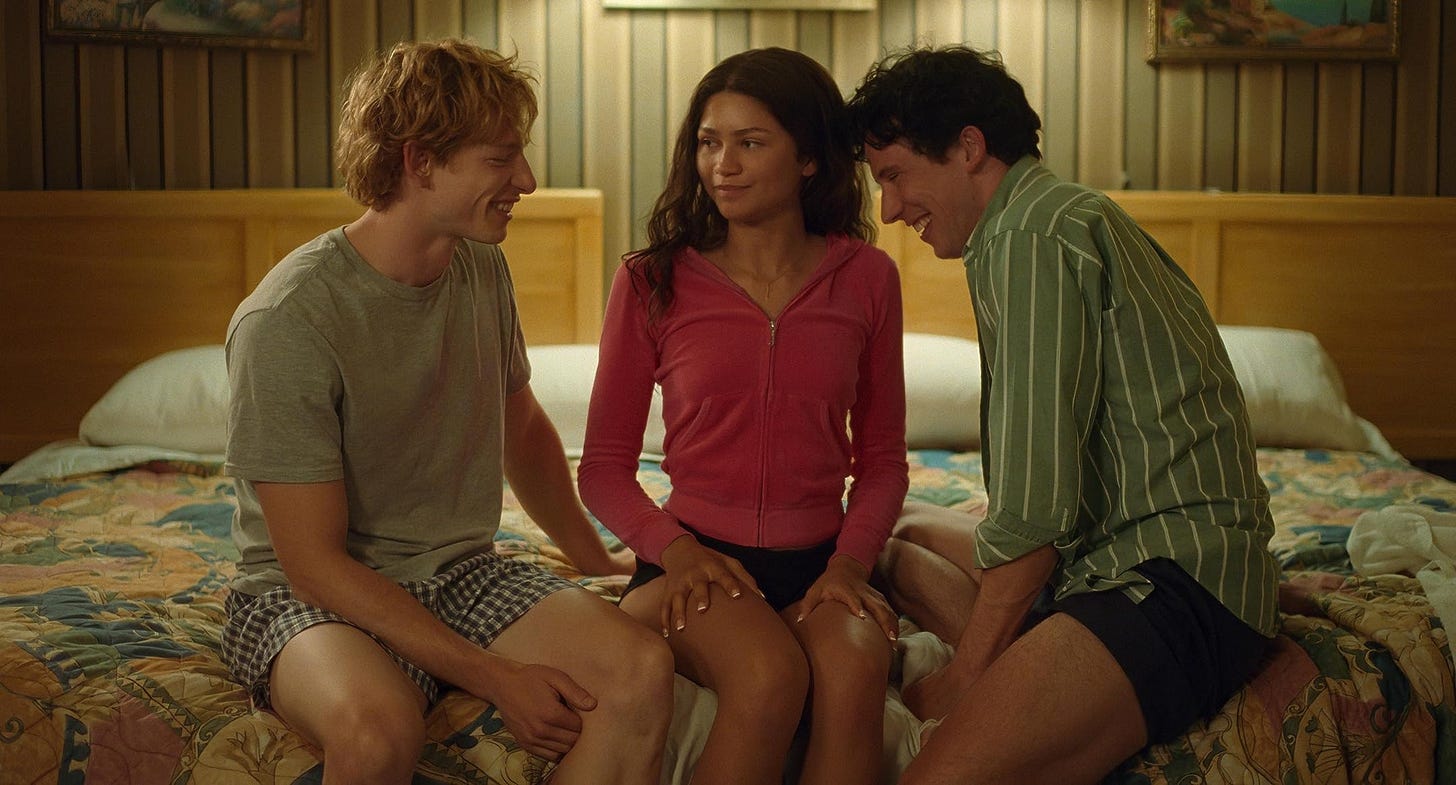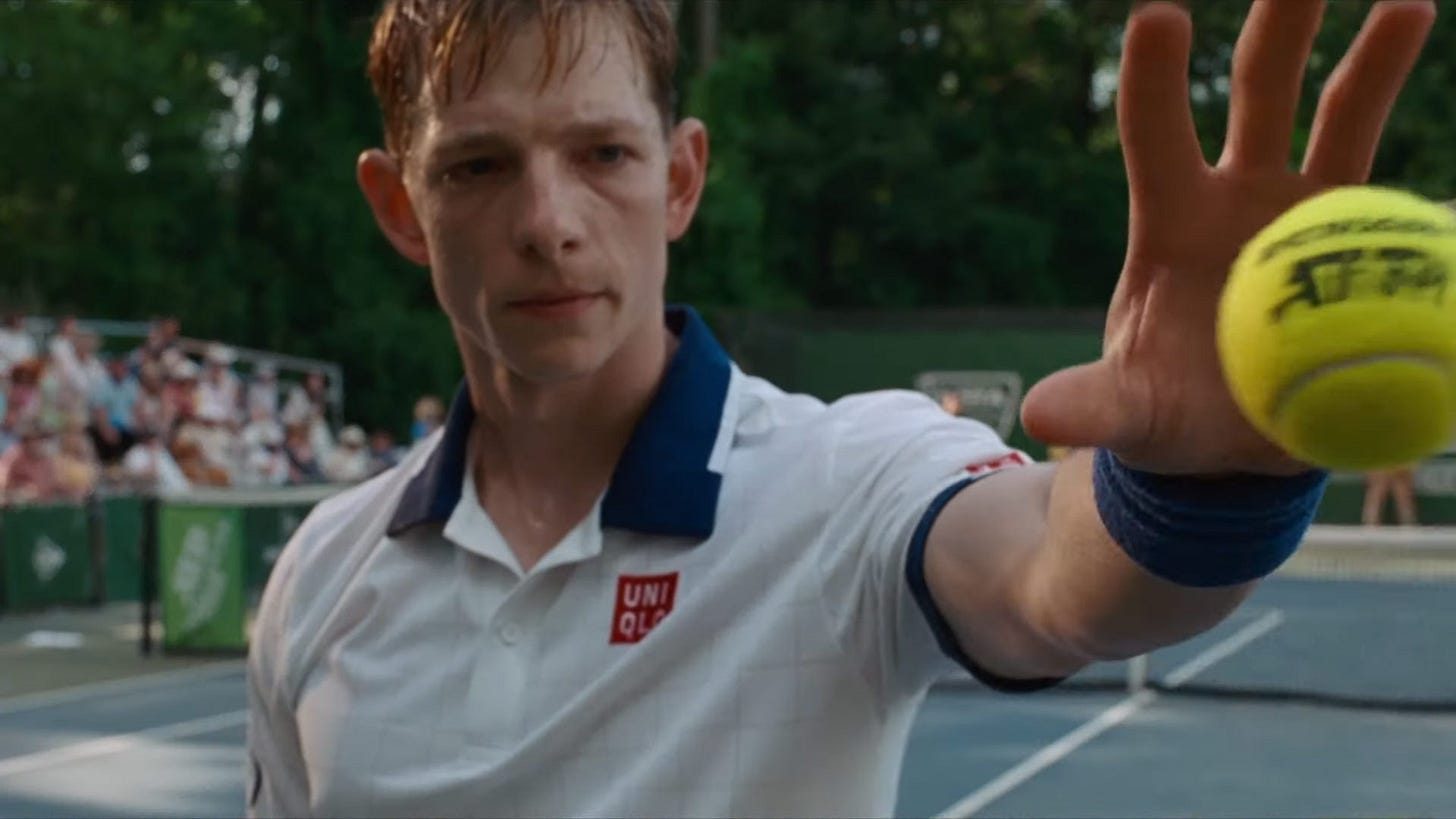‘Challengers’ Review
Lady Macbeth takes center court.
THE THING ABOUT TENNIS is that it’s a mental game more than a physical game. Yes, physicality matters; no, there aren’t many of us who are born with the ability to serve a ball 135 mph. But there are several thousand such, and the difference between those who compete at Wimbledon and Roland-Garros and retire with Omega endorsement money and those who wind up teaching lessons to country club ex-wives is what’s between the ears.
In Challengers, it’s Tashi (Zendaya) who’s playing the mental games. A phenom of the Serena Williams variety coming out of the junior game, Tashi encounters Art Donaldson (Mike Faist) and Patrick Zweig (Josh O’Connor) at a pivotal point in all their lives. She’s just won the women’s junior open; the two young men, champion doubles partners, are about to compete for the men’s title. After an amusingly passionate hotel rendezvous, she tells the two of them that the winner will get her number. Patrick is more skilled at the moment but has a lower ceiling—he serves with his racket stuck behind his back, for Christ’s sake—and he takes the title, and her number, offscreen.
But that’s not where the movie starts. It starts thirteen years later, at a Challenger circuit final, where Patrick and Art are squaring off. Art, married to Tashi, has won six Grand Slams and needs just the U.S. Open to complete the career slam. Patrick is living in his car. And yet the stakes—professional, yes, but just as importantly, personal—have never been higher at this rinky-dink minor-league matchup taking place at a country club. It’s life or death, and feels it, though we’re not entirely sure why until the closing moments.
What director Luca Guadagnino and writer Justin Kuritzkes most effectually imbue the film with is the mental desperation that accompanies high-level professional tennis. It’s not just wanting to win, it’s needing a reason to win; and it’s not just needing a reason to win, it’s needing not to fear losing. Need, fear, the desperate desire not to let down your friends and your loved ones and, most importantly, yourself: these are the demons camped out in the head of every tennis player worth his salt.
Zendaya’s Tashi never hits the professional highs she should have thanks to a devastating knee injury, but she never lost her head for the game or her ability to get into the heads of her “two white boys,” as she (affectionately?) refers to Art and Patrick. To describe her as aloof isn’t quite right; she’s certainly emotionally invested. But less in them than in their success, and this is the key: “We’re always talking about tennis” she says to Patrick at one point when the two of them are both in college having a lover’s quarrel, and what tears him from her is that she means it. They’ll never have a real relationship because she’s always thinking of that moment in the future when she’ll be copyediting an Aston Martin ad featuring her and her husband.
Whoever that might be.
The Lady Macbeth of Centre Court, albeit one who never quite made it there except on the sidelines: That’s Tashi, and it’s somewhat terrifying. In their early encounter, one seen in the trailers, she essentially maneuvers the two guys into making out with one another (it’s more organic than this sounds) and leans back, the camera at a high angle, her face in a mischievous, almost devilish grin: she is in control here—she’s the “homewrecker,” as she somewhat-jokingly refers to herself and her ability to destroy their partnership—and she can make them do whatever she wants.
At one point, Patrick says to her “I’m your peer” and Zendaya’s lip almost instinctively curls into a dismissive snarl and it’s the most impressive, dangerous bit of acting I’ve seen from her over the years: you feel her disgust, her disdain. She’s operating on another level. This boy isn’t her peer: even though she’s still playing Division 1 tennis at Stanford and he’s technically a professional, he’s a mess, she’s a star, and it’s the star power that matters, it’s always been the star power. Stardom creates an aura of invincibility: when you set foot on the court and your opponent thinks he can’t beat you, 99 times out of 100 he can’t, and he won’t.
Because tennis is a mental, and not a physical, game.
Tennis presents a filmmaking challenge because there’s really only one good way to shoot a tennis match, and it’s the way every tennis match is shot: from behind, at a high angle, so you can see the whole court and the point as it develops. Still, Guadagnino tries some different things, shooting the matches in interesting ways like parking a camera at the net so as to give the sense that the ball is coming toward you at dangerous speed. Other efforts are . . . less successful, as when he tries to put the camera in the place of the ball itself, inviting nausea. The soundtrack during these sequences also insists upon itself. We don’t need a nudge to understand the tension is high.
Challengers is funny, steamy, and filled with conniving heroes who tip just a hair toward villainy as they pursue their goals, but never far enough to make us hate them.




